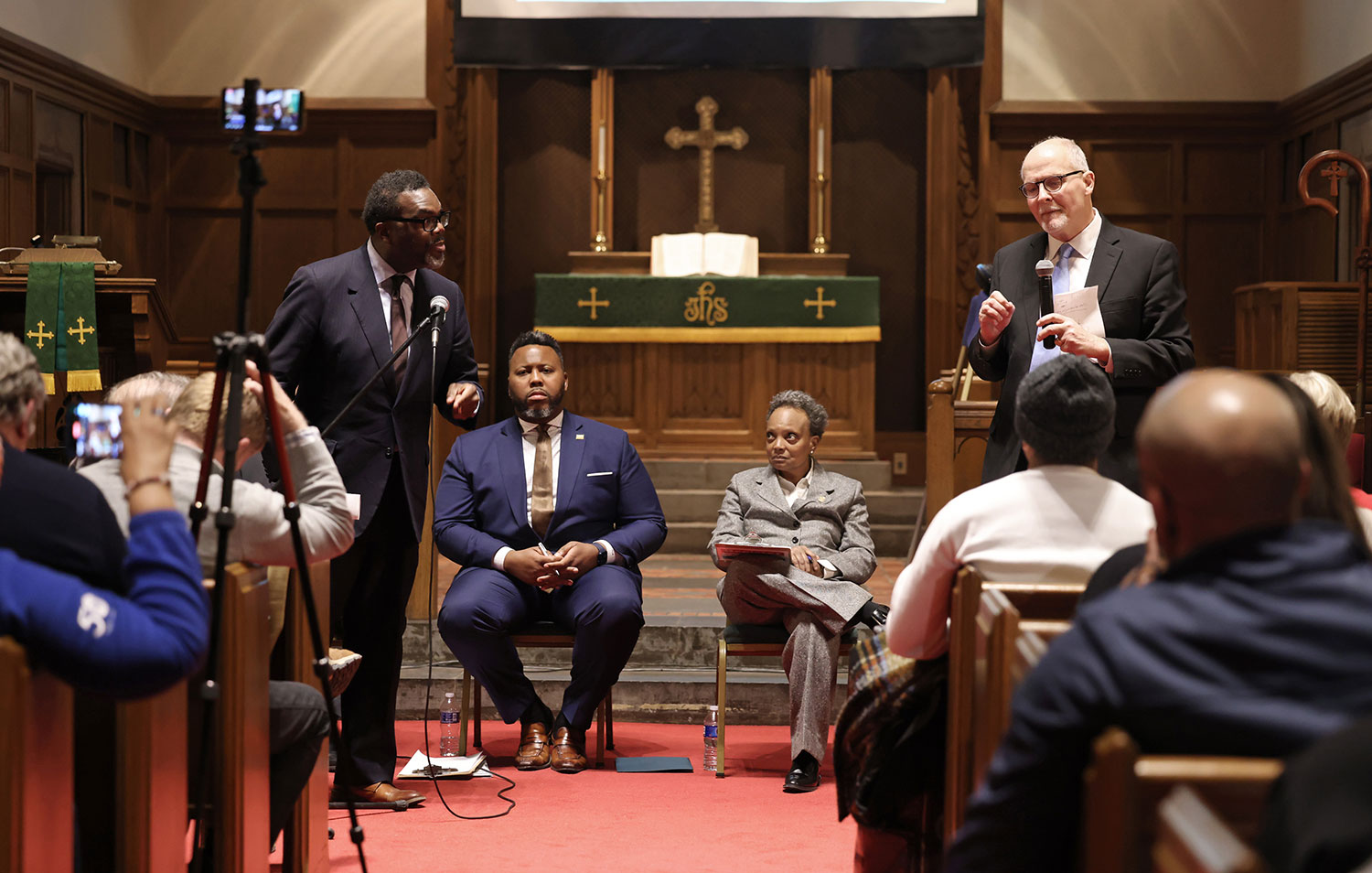The mayoral debate was in a church, but candidates Paul Vallas and Brandon Johnson were not loving thy neighbor.
The subject at the February 3 forum at Bethany Union Church in Beverly was education. Johnson attacked Vallas for creating the Chicago Public Schools’ selective enrollment system during his time as CEO, creating a “stratified” system.
Vallas turned it around on Johnson, a former schoolteacher and a member of the Chicago Teachers Union, which has endorsed his candidacy. The CTU shut down schools for more than a year during COVID, Vallas charged.
“Shutting down the schools for 15 months had devastating consequences, and we’re going to be paying the price for the next generation,” he said.
“We were trying to save lives,” Johnson shot back. “And if saving lives from a 100-year pandemic is an inconvenience to you, guess what, Paul? You don’t deserve to be mayor.”
How would you like to hear those two guys go at each other for an entire hour? I would. A Vallas-Johnson runoff would be the debate Chicago needs to hear: Baby Boom vs. Gen X; hip Black guy who says “G” and “100” during debates vs. grizzled ethnic with just a hint of a Dese, Dem and Dose accent; Back the Blue vs. Black Lives Matter; CPS leadership vs. CTU; urbanite vs. suburbanite. Vallas and Johnson come from completely different sides of the Chicago experience, and their candidacies would provide the city with something we rarely see in a mayoral election: a distinct ideological choice. Lightfoot vs. Preckwinkle was about corruption; Emanuel vs. Garcia and Daley vs. Everybody were about competence. Vallas versus Johnson would duplicate many of the divisions we’re seeing in national politics, right here on the local level.
Let’s take a deeper look at a February 5 IZQ Strategies poll which had Vallas leading with 25 percent, followed by Johnson at 15 percent. Vallas was getting 37 percent of the White vote, Johnson 18 percent. Vallas was winning among voters over 45, with 30 percent, but Johnson led among voters under 45, with 24 percent. College-educated voters favored Johnson over Vallas, 22-21, but Vallas beat Johnson 27-10 among those without a degree. All those demographics are similar to those we saw in 2020 between supporters of Bernie Sanders and Joe Biden, and then between Biden and Trump voters. If you voted for Sanders, there’s a good chance you like Johnson; if you voted for Trump, you’re probably for Vallas. (Only 16 percent of Chicagoans voted for Trump, but that will get Vallas a long way toward the runoff.)
That does not, however, mean Vallas is a Republican, as Mayor Lightfoot keeps insisting. He ran as a Democrat for governor in 2002 and lieutenant governor in 2014. Vallas is not, however, in the vanguard of 21st Century Democratic Party progressivism. He’s running as a law-and-order urban Democrat, a breed we haven’t seen since the late 1960s and early 1970s, when Richard J. Daley was lecturing the press that “the policeman is not there to create disorder, the policeman is there to preserve disorder.” It’s a message for a moment in which 63 percent of Chicagoans feel unsafe in their city, because of crime. To make a political reference from that era, Vallas is going after the Archie Bunker vote. The man is running a brilliant campaign: he knows exactly who’s voting for him and exactly where they live, holding rallies at the Irish American Heritage Center in Mayfair and the Jovial Club in South Chicago. His public safety plan calls for increasing the police force from 11,710 to 13,500, so of course he has the endorsement of the Fraternal Order of Police and its right-wing president, John Catanzara.
Johnson’s public safety message is “treatment, not trauma:” don’t assign police to tasks better suited to social workers, such as mental health emergencies. While Vallas promises to go after “a criminal element that acts with seeming impunity in treating unsuspecting, innocent people as prey,” Johnson wants to eliminate the “root causes” of crime by reopening mental health clinics, creating a youth employment program and funding schools. He never uses the term “defund,” but Lightfoot charged that his “goal is to destroy our police department by cutting our officers.” Johnson is a union activist, not a socialist, but he’s backed by most democratic socialist alders and alder candidates, whose success has helped make his movement possible. Overeducation+underemployment is the most effective formula ever devised for creating socialists, so Johnson will rule among struggling service workers living with multiple roommates in the Milwaukee Avenue corridor. He has the Girl, I Guess Voter Guide endorsement, because of course he does. But he is also “featured prominently” in a documentary on “CTU’s influence at all levels of government” coming soon from the libertarian Illinois Policy Institute.
Johnson talks so often of “raising my family on the West Side” and dodging bullets in his Austin neighborhood that it’s become his debate drinking game cue. WTTW is reporting that Vallas actually resides in Palos Heights, but rents an apartment in Bridgeport to meet the residency requirement to run for mayor. That’s OK with Vallas voters! A lot of them would live in Palos Heights, too, if it weren’t for those municipal employee residency requirements. Now we know why Vallas wants to loosen the Chicago Police Department’s residency requirements by allowing new recruits to live outside the city during their 18-month probationary period.
The latest poll from M3 Strategies, Mayoral Power Rankings’ best friend, has Vallas at 31 percent, Lightfoot at 16.6 percent, and Johnson at 16.5 percent, so this runoff could happen. What makes it even more plausible is that Vallas and Johnson have the most passionate bases of support in the field. Vallas’s voters see him as a strongman who will prevent Chicago from turning into Gomorrah, or Detroit. Johnson’s see a warrior for racial and economic justice. It would be an epic five weeks.



